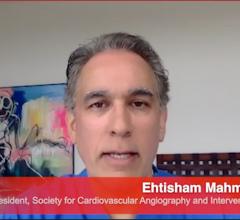May 17, 2020 – A new study sought to reveal whether drug-eluting stents (DES) coated with bioabsorbable polymer (BP) ...
May 17, 2020 — Cindy Grines, M.D., MSCAI, a world-renowned physician credited for pioneering percutaneous coronary ...
May 15, 2020 – A groundbreaking trial recently examined the viability of telemedicine for remote guidance of a ...
Cardiac PET/CT represents a major advancement in cardiovascular diagnostics, offering significant clinical and ...
May 15, 2020 – A late-breaking study aimed to evaluate whether optical coherence tomography (OCT) can predict fractional ...

May 15, 2020 – The Society for Cardiovascular Angiography and Interventions (SCAI) issued a position statement on the ...

Over the past three months COVID-19 has dominated nearly all healthcare news, so it is not surprising that the virus ...
SPONSORED CONTENT — Studycast is a comprehensive imaging workflow system that allows healthcare professionals to work ...
May 14, 2020 – Medtronic announced results from late-breaking clinical trials evaluating the MyCareLink Heart mobile app ...
This podcast is an interview with Ehtisham Mahmud, M.D., FSCAI, president of the Society for Cardiovascular Angiography ...
May 13, 2020 — Cardiac resynchronization therapy (CRT) using biventricular pacing (BVP) or His bundle pacing (HBP) is ...
Providing exceptional cardiovascular care for patients to achieve the best possible outcomes is the number one goal for ...
May 13, 2020 — The PRECEPT study testing the use of the Biosense Webster Thermocool Smarttouch SF Catheter for the ...
May 13, 2020 — The patient-administered nasal spray drug etripamil did not meet its primary endpoint in treating ...
May 12, 2020 — Medtronic has received U.S. Food and Drug Administration (FDA) approval for its Cobalt and Crome ...
Cardiac positron emission tomography (PET) is growing in popularity among cardiologists because it provides the ability ...
May 12, 2020 — The U.S. Food and Drug Administration (FDA) has cleared the next-generation CardioFocus Inc. HeartLight ...
May 12, 2020 — Medis acquired Advanced Medical Imaging Development S.r.l. (AMID), a developer and supplier specialized ...
May 11, 2020 — The American Society for Preventive Cardiology (ASPC) is collaborating with Intervent International to ...


 May 17, 2020
May 17, 2020















